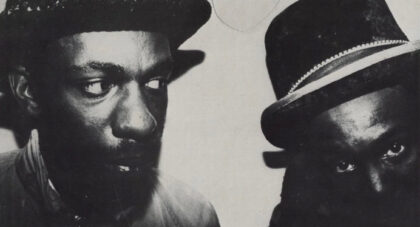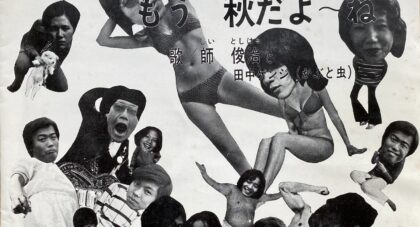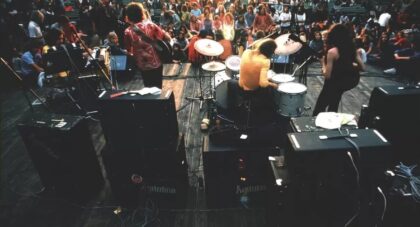Over the past three and a half years, the young, hairy Japanese psychedelic outfit Kikagaku Moyo has quietly amassed a devout cult following via legendary performances across the United States, UK, Europe, and Australia. Not to mention a steady drip of outstanding and brain-bending releases, including Kikagaku Moyo, Mammatus Clouds, and Forest of Lost Children. The first few came on Greek, British and American labels, and since on the band’s own imprint, Guruguru Brain, supported by a legion of “old psych head” fans in faraway places like Serbia and Israel that regularly buy out the label’s vinyl pressings within weeks. Kikagaku Moyo’s self-released 2016 LP, House in the Tall Grass, was one of the most lucid highlights of last year, even if it was more or less unsung. This publication did call it a “flawless and captivating record.” That is not at all an overstatement.
The group now has an excellent new EP, Stone Garden, out tomorrow. It was recorded over two days last year in Prague. The sessions were cut up and spliced together to make five tracks, which proceed from beginning to end with an undulating sense of urgency. “Backlash” and “Trilobites” make frenetic, experimental movements, while “Nobakitani” refines the sprawling meditations of Mammatus Clouds into an elegant and leisurely 8-minute daydream. Both “In A Coil” and “Floating Leaf” harness a murky, propulsive groove, as if “Green Sugar” from House in A Tall Grass was poured into a flooded creek bed atop Mt. Fuji and left to run down the mountain. During our recent conversation at Chatei Hatou in Shibuya, drummer Go Kurosawa mentioned that he wanted to draw on the band’s earliest experiences, when they “only had energy.” Stone Garden is certainly energetic. It’s also invigorating; a descriptor that you look for in psychedelic music. Especially when you need a bite of something to keep the trip flowing in the right direction.
Stream Stone Garden below and read on to learn more about the genesis of Kikagaku Moyo, their struggles developing as an up-and-coming live act in Japan, and the other bands on their label, Guruguru Brain, that are poised for a similar breakout. words / j steele
Aquarium Drunkard: How did y’all start?
Kikagaku Moyo: I met Tomo, the guitarist. He was living in the US studying film. He got back and we met up and said, “Ok. Let’s [start a] band.” Two people. I wanted to play drums, but I had never played before. Tomo played guitar, he said. But he couldn’t really play. [Laughs] So we used an old studio almost every night, from midnight until the morning. Our friend was working there, so we could use it for free. We would play a loop and try to jam. And soon after we saw, “Oh, we cannot do anything.” We were only a two piece so what could we do? Either garage, like garage rock, or psychedelic, which can be kind of stupid.
And then we tried to find people. But we wanted to find people who didn't have experience. And like, don’t know how to play, but just want to play music together. We put many signs everywhere and went to college and made a psychedelic poster and gave it to people. Tomo actually got in trouble at college because he put it everywhere. “You cannot do that. What’s this psychedelic poster everywhere?!” [Laughs] And then we found our bassist one day. He was recording vending machine sounds with a recorder for his drone project. We talked to him, “What are you doing? Let’s play music.” “Oh, okay.” The other guitarist. He was working in the same college that Tomo went to. He looked really weird. Huge beard. Long hair. Rolling cigarette…”Do you play?” “Yeah, yea, yeah.” “Do you want to play in a band?” “Yeah, okay.” We didn’t know anything. Then my brother plays sitar. He was in India and came back. So all of us played music and that’s how we started.
Gig wise it’s difficult because we have totally different system. We have to pay to play. Usually $300 for a 30-35 minute set. We did that a few times. “This is not going anywhere.” So we decided to go abroad. We did an Australian tour for two weeks and then it started happening. We got offers from a label and we played Austin Psych Fest / Levitation in 2014.
Only the good shit. Aquarium Drunkard is powered by its patrons. Keep the servers humming and help us continue doing it by pledging your support.
To continue reading, become a member or log in.


